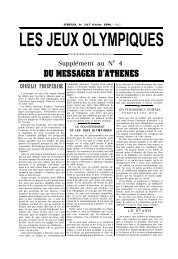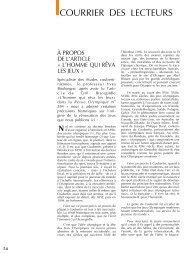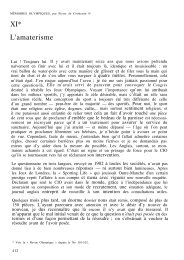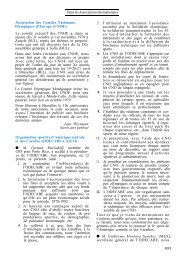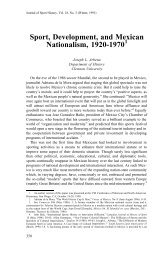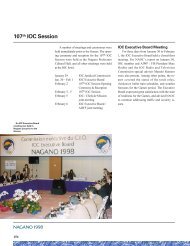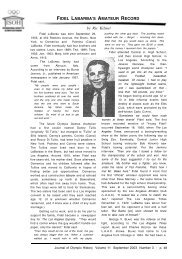Sport and Colonialism in 19th Century Australasia - LA84 Foundation
Sport and Colonialism in 19th Century Australasia - LA84 Foundation
Sport and Colonialism in 19th Century Australasia - LA84 Foundation
Create successful ePaper yourself
Turn your PDF publications into a flip-book with our unique Google optimized e-Paper software.
III<br />
Students of British sports history are blessed not only with<br />
many more detailed historical works which provide the background<br />
for their studies, but also with a more developed historical<br />
study of the specific area of leisure <strong>and</strong> recreation. Major<br />
works by R.W. Malcolmson, Peter Bailey, Hugh Cunn<strong>in</strong>gham <strong>and</strong><br />
James Walv<strong>in</strong>, cover<strong>in</strong>g the eighteenth <strong>and</strong> n<strong>in</strong>eteenth centuries,<br />
offer the student of recreation or sports history a broad context<br />
for their analysis <strong>and</strong> <strong>in</strong>terpretation. Equally, however,<br />
these works can be used by the student of colonial Australia,<br />
for they provide the means of measurement or evaluation through<br />
comparison. 10<br />
At the time of the New South Wales settlement British society<br />
was beg<strong>in</strong>n<strong>in</strong>g its dynamic transformation from a rural, agricultural-based<br />
society to one based on urbanised <strong>in</strong>dustrialisation,<br />
<strong>in</strong> which new notions of morality, <strong>in</strong>dustry <strong>and</strong> progress were to<br />
play important parts. These new notions had a dramatic, if<br />
gradual, effect on popular leisure <strong>and</strong> recreation, which came<br />
under attack because they were seen as subvert<strong>in</strong>g the productivity<br />
<strong>and</strong> <strong>in</strong>dustrial progress of the new society. Prior to the<br />
<strong>in</strong>dustrial period leisure was an accepted part of British life,<br />
<strong>and</strong> gambl<strong>in</strong>g was an accepted part of British leisure. Little<br />
dist<strong>in</strong>ction was made between work <strong>and</strong> leisure <strong>in</strong> a society which<br />
was task oriented, as long as the particular task was done. But<br />
British rural society did devote special attention to leisure <strong>in</strong><br />
the form of fairs <strong>and</strong> feast days, which <strong>in</strong>variably occupied a<br />
special place <strong>in</strong> the annual calendar of events for each region.<br />
Apart from their more obvious economic <strong>and</strong> social functions,<br />
the fairs provided a means of social control. They provided the<br />
populace with an opportunity to let their hair down, or to let<br />
off steam <strong>in</strong> a controlled environment. They also provided occasions<br />
to look forward to or to rem<strong>in</strong>isce about, thus susta<strong>in</strong><strong>in</strong>g<br />
the workforce between events. Football matches, cudgell<strong>in</strong>g<br />
events, or other violent contests, served the purpose of channell<strong>in</strong>g<br />
hostilities <strong>in</strong>to isolated mangeable conflicts. Accord-<br />
<strong>in</strong>gly, the rural fairs <strong>and</strong> similar events were sponsored by the<br />
gentry, or the dom<strong>in</strong>ant classes, as useful <strong>and</strong> even necessary<br />
occasions for promot<strong>in</strong>g the well be<strong>in</strong>g of the community. 12<br />
7



